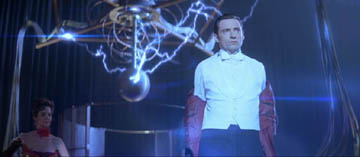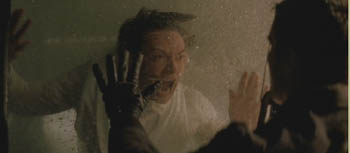|
Are you watching closely?  Well, are you? Huh? Motherfucker? If so, then you just might figure out the answer to this cinematic puzzle before the final minutes of its run time. Then again, you might not. This film, in a rare instance amongst so many generic examples of storytelling, is smart. Not clever, not witty or postmodern-smug, but actually just plain smart. To figure it out, one must be cognizant of what is being watched, and what is being shown here is a magic trick, a form of entertainment that's predicated largely on the idea that the audience wants to buy into what they see. They want to be fooled. And even if you don't, you might be, anyway. I am not, for the record, going to tell you how the trick works; that's what the process of watching the film is meant to do, and I only divulge supposed spoilers for films I hold in contempt, usually for the crime of holding the audience in contempt (the standard "fake ending" that appears at the close of any and every horror movie made in the last billion years, for example). If you figure it out, good for you. If you don't, well, then even better for you; you're probably going to have more fun. In Victorian England, two stage magicians attempt to subvert and one-up each other in an increasingly hostile spiral after a tragic accident caused by one leaves the other's wife dead, the victim of a botched performance. The possibly guilty party in her death, Borden, has a trick he believes will bring him fame and fortune. Bitter rival Angier becomes obsessed with discovering the nature of the trick, and as the cycle of revenge spins out of control, the lives of both men begin to implode, and we as audience members begin to wonder which, if either, man we should be pulling for. 
Nearly as important as the story itself is the manner in which it's told. Director Christopher Nolan, who attained a measure of art-house success with the backwards-structured Memento and a heavy dose of mainstream success with Batman Begins, has crafted a detail-rich nonlinear narrative that begins at the end of the second act and winds backwards through time via Bordon's perusal of Angier's journal, which is, in turn, largely concerned with the deciphering of Borden's own journal. It requires and rewards close scrutiny, but plays out in a fashion that's ultimately more natural and organic than Memento's more showy, though still effective, exercise in construction. The film dares us to catch its trick in action, while cautioning us all along that there may not even be a trick at work, a possibility that, in terms of stage magic, is tantamount to cheating. At the same time, Nolan manages to keep our interest and involvement with these pair of increasingly despicable men, a tendency towards the morally ambiguous that's followed him throughout his so far impressive career. It's impossible to describe all the ways in which this film is admirable without giving away its secrets; even divulging the nature of the abundant clues we're given will potentially spoil the surprise, as so much of what the film is ultimately hiding is bound up in the method by which the story is told. The Prestige is one big, elaborate puzzle that finally snaps together with clean precision, eschewing the endless amibiguities that dog the heels of every mysterious event in the films of, for example, David Lynch, opting instead for a story which is ultimately fully explicable, if still fantastical. Nolan keeps the film sharp and focused, never letting it slip into smirking, self-aware wink wink, nudge nudge territory, as so often happen when directors aspire to show their wares to an all-too cinematically conscious public. There's also none of the austere reserve that often suffuses ostensible period dramas; the story is relentlessly and aggressively engaging, portraying a past not old-fashioned and quaint but exciting and vibrant with potential. Even when the end is known (or possibly guessed), there are still myriad details skulking about in its telling of the tale that can only be appreciated on repeat viewings, and this film definitely earns them. Also, Scarlett Johansson's in it. No complaints there. -review by Matt Murray
|
|
||||||||